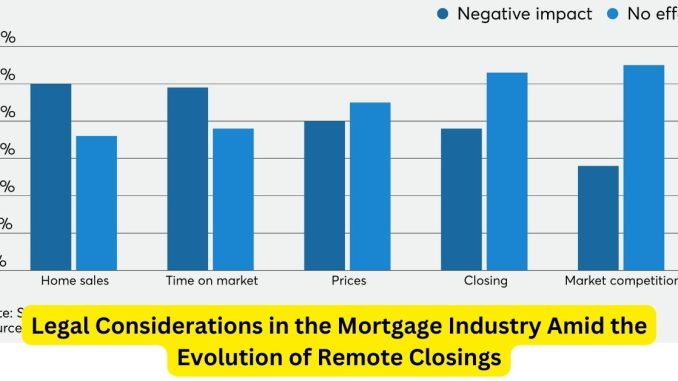
The traditional process of closing a mortgage transaction, often characterized by in-person meetings and voluminous paperwork, has undergone a transformative shift with the rise of remote closings. As the mortgage industry adapts to the era of digital innovation, attorneys find themselves at the forefront, navigating the legal considerations associated with remote closings.
Authentication and Identity Verification: One of the primary legal considerations in remote closings revolves around ensuring the authenticity of the parties involved. Attorneys play a critical role in implementing robust identity verification processes to confirm the identities of borrowers, notaries, and other stakeholders participating in the remote closing. This includes compliance with e-signature laws and the use of secure authentication methods to prevent fraud.
Compliance with E-Signature Laws: Remote closings heavily rely on electronic signatures, necessitating compliance with e-signature laws and regulations. Attorneys guide lenders in adopting e-signature platforms that adhere to legal standards, ensuring the validity and enforceability of electronically signed documents. This includes confirming that borrowers provide informed consent to use electronic signatures throughout the closing process.
Notary Requirements and Remote Online Notarization (RON): Attorneys navigate the evolving landscape of notary requirements, especially in jurisdictions where Remote Online Notarization (RON) is gaining acceptance. Legal professionals ensure that lenders adhere to state-specific regulations regarding RON, verifying that notaries have the necessary certifications and that the remote notarization process complies with local laws.
Data Privacy and Security: The transition to remote closings places a premium on protecting sensitive borrower information. Attorneys work to establish robust data privacy and security protocols, ensuring that lenders adhere to regulations such as the Gramm-Leach-Bliley Act and safeguard borrower data against unauthorized access or breaches. Legal scrutiny is crucial in maintaining the confidentiality and integrity of the closing process.
Compliance with State and Federal Regulations: Legal professionals guide lenders through the complex web of state and federal regulations governing mortgage transactions. As remote closings may involve different legal requirements across jurisdictions, attorneys ensure that lenders navigate these regulatory landscapes seamlessly. This includes compliance with RESPA, TILA, and other relevant laws that impact the mortgage closing process.
Documentation and Recordkeeping: Attorneys emphasize the importance of comprehensive documentation and recordkeeping in remote closings. Lenders must maintain detailed records of the closing process to demonstrate compliance with legal requirements. Attorneys ensure that the electronic records are securely stored and easily accessible for auditing purposes.
Consumer Protection and Education: The shift to remote closings underscores the need for consumer protection and education. Attorneys advocate for clear communication and disclosure throughout the process, ensuring that borrowers understand the implications of remote transactions. Legal professionals play a role in drafting consumer-friendly documents and guiding lenders in implementing educational initiatives for borrowers.
In conclusion, as remote closings become more prevalent in the mortgage industry, attorneys serve as integral guides, navigating the legal considerations that accompany this evolution. By addressing authentication, compliance with e-signature laws, notary requirements, data privacy, and regulatory compliance, legal professionals play a pivotal role in ensuring that remote closings align with legal standards, providing a seamless and secure experience for all parties involved in the mortgage transaction.
Leave a Reply